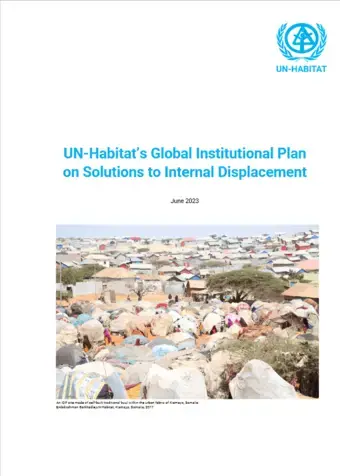UN-Habitat’s Global Institutional Plan on Solutions to Internal Displacement
In June 2022, in follow-up to the report by the High-Level Panel on Internal Displacement, the United Nations Secretary-General launched his Action Agenda on Internal Displacement. The Action Agenda calls for the UN family to step up its efforts to advance solutions at scale to internal displacement, prevent future displacement crises from emerging, and strengthen the quality of protection and assistance provided to those who are already displaced.
For the first time, the Action Agenda recognizes the linkages between displacement and urbanization, highlighting the core role of local governments and the importance of urban planning in addressing displacement issues. In an increasingly urbanizing world, displacement is becoming an urban phenomenon, with most of the 59.1 million internally displaced people globally seeking refuge in cities rather than in camps, hoping for better access to services and livelihoods. However, massive, or rapid influxes of people in cities, especially when caused by crises, comes with challenges for governments, particularly local governments. The latter often struggle with pressure on basic services, infrastructure, and housing supply. Resulting strains can exacerbate the vulnerabilities experienced by the urban poor in destination and by host communities, forcing more people to live in informal settlements or inadequate housing, with associated environmental consequences and social tensions.
Solutions require a full integration of the displacement challenges into urban development, urban management, and urban financing strategies. This can help to support stabilisation and provide peace dividends in conflict situations and create co-benefits for both host communities and displaced people, promoting an inclusive and green urban future, hence meaningfully contributing to the achievement of SDG 11- Sustainable cities and communities and to the implementation of the New Urban Agenda.
In line with its Strategic Plan 2020-2023 and with the decision by its Executive Board in November 2022 for UN-Habitat to “take up its role of supporting UN country teams (…) in response to the Secretary-General’ Action Agenda on Internal Displacement”, UN-Habitat’s Institutional Plan on Solutions to Internal Displacement intends to ensure that UN-Habitat can maximize its contribution to UN efforts to scale sustainable solutions. This includes a focus on strengthening and contributing its expertise in solutions to internal displacement in urban settings. UN-Habitat will promote territorial and integrated multisectoral approaches across multilevel governance systems and across the humanitarian-development-peace nexus. UN-Habitat aims to improve knowledge on urban displacement through high-quality and trusted data and spatial analysis, to support the development of normative frameworks and tools on solutions to address displacement in urban areas. This work, in close collaboration with the Resident Coordinators and the UN Country Teams, and where possible IFIs, will ensure the integration of sustainable, integrated and people-centred pathways to solutions in urban areas in the national strategies.
The institutional plan clarifies what can be done within existing resources and ideas around scalability are included as additional resources are mobilized. This will also form the basis for the workplan of the subprogramme 4 team within the Programme Development Branch.
